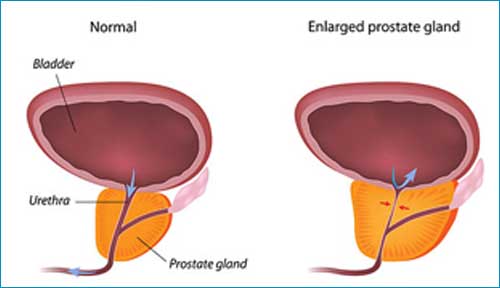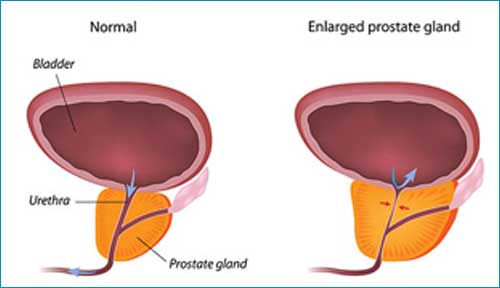What is prostate gland and where is it located?
Prostate gland is a male reproductive organ which secretes prostate fluid in semen. Muscles of the prostate help to propel seminal fluid into the urethra during ejaculation. It is situated just below the bladder, allowing passage of first part of urine tube through it to the outside. It is protected by the pelvic bone all around and is accessible for examination to the doctor through the rectum.
What are the common medical problems affecting the prostate?
Two most common and important medical conditions involving the prostate gland are non-cancerous enlargement of the prostatecausing obstruction to urine flow and cancer of the prostate gland.
Prostate enlargement happens to almost all men as they get older. As the gland grows, it can press on the urethra and cause urination and bladder problems. An enlarged prostate is often called benign prostatic hyperplasia (BPH).
This is a disease of aging men and normally seen above 50 years of age. Not all prostate enlargement needs to be treated; the best outcome of treatment occurs in patients who have definite obstruction to urine flow. Medical treatment for prostate is quite effective although it needs to be taken long term and a fifth of patients on medical treatment can have side-effects. Surgical treatment of prostate enlargement is one of the most commonly performed operations in urology and is quite effective. Of course, as in any operation, there are side effects; but incidence of major side-effects in good hands are negligible. Moreover, this is an endoscopic operation without making any cuts in the body and has very short hospital stay, the added advantage being avoidance of side-effects due to medications.
Surgical treatment of prostate enlargement is one of the most commonly performed operations in urology and is quite effective. Of course, as in any operation, there are side effects; but incidence of major side-effects in good hands are negligible. Moreover, this is an endoscopic operation without making any cuts in the body and has very short hospital stay, the added advantage being avoidance of side-effects due to medications.
Cancer of the prostate is a widespread problem in the aging population world-wide. The number of new cases of prostate cancer was 119.8 per 100,000 men per year in the united states with number of deaths at 20.1 per 100,000 men per year. There are three well-established risk factors for prostate cancer: increasing age, ethnic origin, and genetic predisposition.A hospital based survey carried out in 2003 in the UAE reported low incidence of prostate cancer,with annual incidence of prostate cancer estimated at 4.5/100,000 male population. Majority of patients (77.7%) presenting with advanced disease. This clearly indicates that in population based study in the UAE, one would expect higher incidence of prostate cancer. Screening for prostate cancer would surely lead to diagnosis of prostate cancer in early stages, and therefore, readily amenable for curative treatment. Screening for prostate cancer is known to reduce deaths due to prostate cancer, and should be strongly pursued. A 2015 study by Health Authority Abu Dhabi revealed that Prostate cancer is 4th most prevalent cancer in adult men in UAE. Screening PSA and digital rectal examination by the urologist in men above 50 years of age, or younger if risk factors are present, is recommended. Persons with raised PSA and/or abnormal prostate on palpation should undergo multiparametric MRI and systematic/targeted biopsy of the prostate. Prostate cancer can then be risk-categorized into low, intermediate and high-risk categories. Unlike other cancers, prostate cancer is relatively slow growing disease and readily treatable with surgery, radiation therapy, hormonal therapy and chemotherapy agents. In certain low risk prostate cancers, treatment is not indicated immediately, and patients are put on active surveillance. Organ confined prostate cancers of intermediate and high-risk category should be treated with surgery or external beam radiotherapy with curative intent. Adjuvant or neo-adjuvant treatment may be necessary based upon results of various other test results such as final biopsy.
Surgical removal of the prostate can be accomplished through open or key-hole surgery. Advantage of key-hole surgery is clearly apparent with shorter hospitalization and early discharge from the hospital with indwelling catheter for 2 weeks.
Once prostate cancer has spread beyond the confines of the prostate and regional lymph glands, control and not cure would be the goal of management. Even so, prostate cancer is highly responsive to hormonal treatment, although duration of remission is variable. When castration resistant prostate cancer has spread to various partsof the body, survival can further be improved in this group of patients, by use of new androgen receptor signalling inhibitor and chemotherapy.
In summary, early diagnosis is the key to survival benefits in prostate cancer. As far as proper balance can be maintained between benefits versus unnecessary overtreatment by adhering to guidelines and protocols, medical fraternity will go a long way in improving men’s health in this group of patients. As Eleanor Roosevelt put it – Yesterday is history, Tomorrow is mystery, Today is a gift –So, get screened for prostate cancer.
